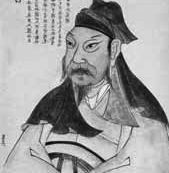Songs to the Peonies Sung to the Air: “Peaceful Brightness”
translated from the Chinese by Florence Wheelock Ayscough
I
The many-coloured clouds make me think of her upper garments, of her lower garments;
Flowers make me think of her face.
The Spring wind brushes the blossoms against the balustrade,
In the heavy dew they are bright and tinted diversely.
If it were not on the Heaped Jade Mountain that I saw her,
I must have met her at the Green Jasper Terrace, or encountered her by accident in the moon.
II
A branch of opulent, beautiful flowers, sweet-scented under frozen dew.
No love-night like that on the Sorceress Mountain for these;
Their bowels ache in vain.
Pray may I ask who, in the Palace of Han, is her equal?
Even the “Flying Swallow” is to be pitied, since she must rely upon ever new adornments.
III
The renowned flower, and she of a loveliness to overthrow Kingdoms——both give happiness.
Each receives a smile from the Prince when he looks at them.
The Spring wind alone can understand and explain the boundless jealousy of the flower,
Leaning over the railing of the balcony at the North side of the aloe-wood pavilion.
This poem is in the public domain. Published in Poem-a-Day on May 11, 2024, by the Academy of American Poets.
“Songs to the Peonies Sung to the Air: ‘Peaceful Brightness’” appears in Fir-Flower Tablets (Houghton Mifflin Co., 1921). This anthology is composed of poems translated by Florence Wheelock Ayscough and the English versions were edited by Amy Lowell. Ayscough mentioned in her introduction that Li Bai’s poetry “[is] of universal lyricism.” Li Bai lived during the Tang dynasty, and as Ayscough noted, “Song to Peonies” is based on the account of the love story between the Emperor Xuanzong of Tang and and his favorite concubine, Yang Guifei, on a spring morning, and she says, “In the third ‘Song,’ there is an allusion to the Emperor under the figure of the sun. When his presence is removed, the unhappy, jealous flowers feel as if they were growing on the North side of the pavilion.” Associate professor of Chinese, Paula M. Varsano in her article, “Immediacy and Allusion in The Poetry of Li Bo,” affirms, “[Li Bai] defamiliarized allusions by explicitly referring to their pastness and assumed universality, thus leading his readers to rethink the commonplace and feel the effect of liberation, spontaneity. […] Li raises his voice above the chorus of the past——deliberately establishing that he directs their song rather than being directed by it. This has immediate bearing upon his reputation as the ‘banished immortal’; if we regard allusion as the poetic embodiment of cyclical time, Li Bo was able to pose as one who had stepped beyond the bounds of that cycle.”

